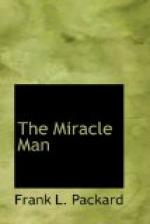“Do you get that, Helena—he’s going blind! In just a few days, my dear, you will be with me, have patience. The meteorological bureau is a little hazy yet on the exact date of the total eclipse, but it’s due to happen any minute. Now listen. Your name is Helena Vail. You’re the Patriarch’s grand-niece, and you’re coming to live alone with him and soothe his declining years; but you can’t come yet because I’ve got to find you first, and besides, until he’s blind, he’ll stick to a nasty habit he’s got of asking questions on his little slate. You needn’t have any hesitation about coming on the score of propriety, I assure you it is perfectly proper—he is running Methuselah pretty near a dead heat. And, as far as the town is concerned, apart from the fact that you are a grand-niece, orphaned, you don’t have to know anything about yourself, either—that’s part of the Patriarch’s dark, mysterious past, where the lights go out and the fiddles get rickets.
“That’s about all. I’ll let you know when to come. Remember me to Mr. Coogan and Harry, and keep my picture under your pillow. Ever thine, J.G.M.”
Madison picked up his pen again and added another line:
“P.S. Better buy a cook-book.”
He folded the pages, inserted them in the envelope, sealed the envelope and addressed it to Miss Helena Smith—street and number not far from the tenderloin district of New York.
Then Madison yawned pleasantly, tucked the letter in his pocket—and prepared for bed.
—VI—
OFFICIALLY ENDORSED
Ten days had passed, bringing with them many changes. The snow was gone, and the warm, balmy airs of springtime had brought the buds upon the trees almost to leaf. It seemed indeed a new land, and one now full of charm and delight—the desolate, straggling hamlet, once so barren, frozen and hopeless looking, was now a quaint, alluring little village nestling picturesquely in its hollow, framed in green fields and majestic woods. Quiet, restful, peaceful it was—like a dream place, untroubled. Upon the farms about men plowed their furrows, calling to each other and to their horses; in the homes the doors and windows were thrown hospitably wide to the sweet, fresh, vernal airs, and the thrifty housewives were busy at their cleaning.
And there had been other changes, too. The ten days had found Madison more and more a constant visitor, and finally a most intimate one, at the Patriarch’s cottage—while to the circle in the hotel office his voice no longer rose in even feeble protest, he was one of them. And, perhaps most vital change of all, the Patriarch was nearly blind—so nearly blind that conversation now was limited to but little more than a single word at a time upon the slate.
It was morning, in the Patriarch’s sitting-room, and Madison was seated in his usual place beside the table facing the other. For upwards of an hour, it had taken him that long, he had been engaged, having decided that the time was ripe, in telling the Patriarch that his grand-niece had been found and that now it was only necessary to write and ask her to come to Needley.




